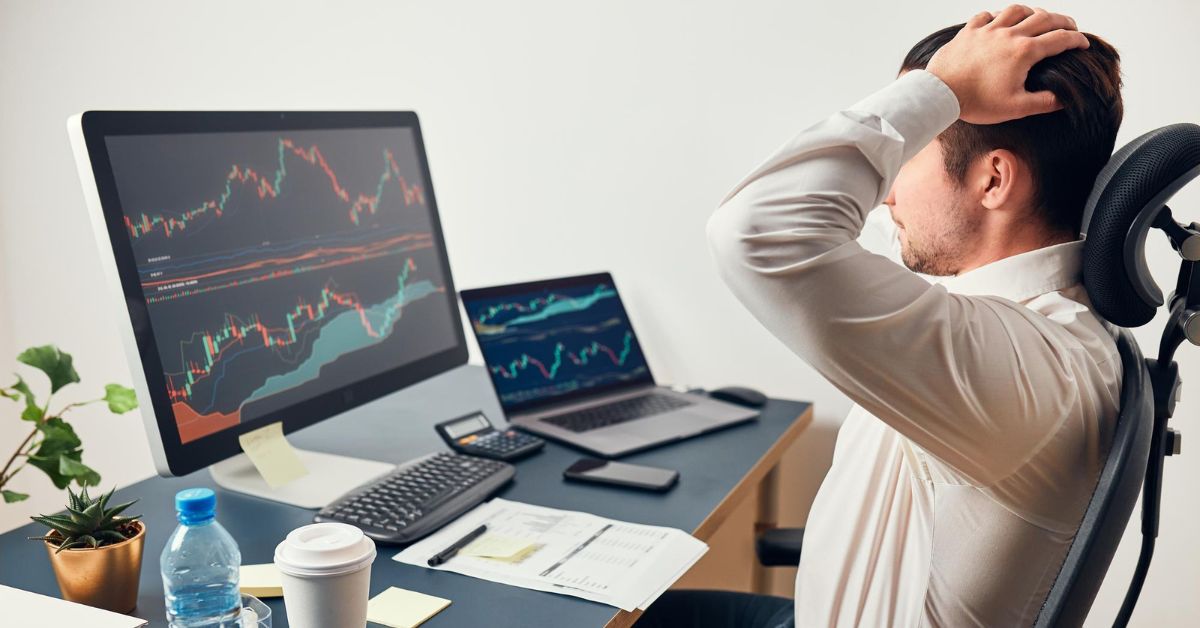Trading in financial markets can be thrilling, but it often comes with a significant amount of stress. Making quick decisions, managing risks, and staying on top of market movements can be stressful. It’s crucial to understand and manage this stress for your mental health and trading performance.
In this article, we will explore the various aspects of trading stress. We will examine its causes, how it affects traders, and strategies for handling it and overcoming it. These techniques can help you improve your trading performance and maintain a healthy lifestyle.
A reliable trading platform, such as Prime XBT, can reduce some of this stress. Prime XBT offers various tools and resources to help traders navigate the markets. With advanced charting tools and educational resources, you can make a big difference. So, join PrimeXBT today! Use promo code PRIMEOTT to receive a +7% bonus on your deposit.
What is Trading Stress?

Trading stress is the anxiety and pressure traders experience while buying and selling assets. It stems from the fast-paced, high-stakes nature of financial markets. Unlike everyday stress, trading stress is specific to the demands of trading activities. Traders must constantly make quick decisions, often with significant financial implications.
This environment creates a unique set of stressors. Market fluctuations, financial risks, and the need to stay informed all contribute to trading stress. Recognizing and understanding this type of stress is essential for managing it effectively. If traders identify its causes and symptoms, they can mitigate its effects on their performance.
Common Sources of Trading Stress
Trading stress stems from various factors inherent in the trading environment. Understanding these sources can help traders manage and mitigate stress effectively.
Market Volatility
Market volatility causes rapid price changes, creating uncertainty for traders. These fluctuations can make it challenging to predict market movements accurately. The constant changes in asset prices require traders to be vigilant and adaptable, which can be mentally exhausting. This uncertainty often leads to heightened anxiety as traders must quickly respond to market conditions to avoid losses.
Financial Risk and Loss
The possibility of losing money is a significant stressor in trading. Financial losses can severely impact a trader’s mental and emotional well-being. The fear of substantial financial loss can lead to excessive worry and second-guessing decisions. Traders often experience stress from balancing potential gains with the risk of losing their investments, which can strain their mental health.
Decision-Making Pressure
Traders often need to make quick decisions under pressure. The need to choose correctly can lead to significant stress and anxiety. This pressure can be overwhelming, especially during volatile market conditions. The constant decision-making process can lead to mental fatigue, affecting the trader’s ability to think clearly and make rational choices.
Information Overload
Constantly analyzing vast amounts of data is overwhelming for traders. This information overload can result in mental fatigue and stress. The need to stay updated with market news, trends, and financial reports can be daunting. Managing and interpreting this data to make informed decisions adds to the cognitive load, increasing stress levels.
Performance Expectations
High-performance expectations from oneself or others can be stressful. The fear of not meeting these expectations adds to the pressure. Traders often set ambitious goals, and the pressure to achieve them can be overwhelming. External expectations from clients or stakeholders can further intensify this stress, impacting performance and mental health.
Isolation
Trading can be a solitary activity, leading to feelings of isolation. Isolation from social interactions can increase stress and anxiety. The lack of social support can make it harder to cope with the pressures of trading. With a network to share experiences and gain support, traders may feel supported in their challenges, exacerbating stress levels.
Economic and Political Events
Unexpected economic or political events can significantly impact markets. These events create additional stress as traders must quickly adapt to changing conditions. The uncertainty surrounding such events can lead to heightened anxiety as traders anticipate and react to potential market disruptions. Staying informed about global events while managing trades can be particularly stressful.
Signs and Symptoms of Trading Stress

Recognizing the signs and symptoms of trading stress is crucial for addressing it effectively. Stress can manifest in various ways, impacting both the mind and body.
Physical Symptoms
Physical symptoms of trading stress can include headaches, fatigue, and muscle tension. These symptoms are the body’s natural response to prolonged stress.
Traders might also experience sleep disturbances, such as insomnia or restless sleep, which can further exacerbate physical fatigue. Chronic stress can lead to more severe health issues like hypertension or heart problems, highlighting the importance of addressing these symptoms early.
Emotional Symptoms
Emotional symptoms include anxiety, irritability, and mood swings. Stress can significantly impact a trader’s emotional well-being. Traders may feel overwhelmed by market fluctuations and the constant pressure to make profitable trades.
This emotional turmoil can lead to feelings of frustration and helplessness, which can affect personal relationships and overall life satisfaction.
Behavioral Symptoms
Behavioral symptoms of trading stress are changes in trading patterns and increased impulsivity. Traders may start making hasty decisions without thorough analysis.
This impulsivity can lead to significant financial losses and reinforce a cycle of stress. Additionally, traders might withdraw from social interactions and activities they once liked, preferring isolation to engagement.
Cognitive Symptoms
Cognitive symptoms include impaired concentration and difficulty in decision-making. Stress can cloud a trader’s judgment, leading to mistakes and poor decision-making. Traders may find it hard to focus on market analysis or develop coherent trading strategies.
This cognitive impairment can reduce trading effectiveness, creating a feedback loop where poor performance increases stress levels.
Psychosomatic Symptoms
Psychosomatic symptoms are physical ailments caused or worsened by stress. These can include stomachaches, dizziness, and other unexplained aches and pains.
Under significant stress, traders might also have changes in appetite, which can further affect their health. Recognizing these symptoms is essential for taking steps to reduce stress and improve overall well-being.
The Impact of Trading Stress on Performance

Stress can have a profound effect on trading performance, influencing decision-making and overall effectiveness. Understanding these impacts is essential for traders seeking to improve their results.
Impaired Decision-Making
Stress can lead to impaired decision-making abilities. When under pressure, traders may struggle to analyze market data effectively. This inability to process information clearly can result in hasty decisions that are not well thought out. Stress can also cloud judgment, making it difficult for traders to stick to their strategies or adhere to risk management practices.
Increased Impulsivity
Under stress, traders may exhibit increased impulsivity in their trading actions. This impulsivity can manifest as entering or exiting trades without proper analysis. Traders might chase losses or take unnecessary risks, which can lead to significant financial setbacks. This behavior often exacerbates stress levels, creating a vicious cycle that can be hard to break.
Reduced Focus and Concentration
High levels of stress can reduce a trader’s focus and concentration. When distracted by anxiety and worry, traders may overlook critical market signals or miss opportunities. This lack of concentration can hinder a trader’s ability to analyze charts and execute trades effectively. Over time, reduced focus can significantly impact overall trading performance.
Emotional Reactions
Stress can lead to heightened emotional reactions, affecting trading behavior. Traders under stress may experience fear, frustration, or panic, leading to poor choices. These emotional responses can cloud judgment and prompt traders to abandon their strategies. Emotional trading often results in regret and increased stress, compounding the challenges traders face.
Long-Term Performance Decline
Persistent stress can contribute to a long-term decline in trading performance. Over time, the cumulative effects of stress can lead to burnout, reducing motivation and engagement. Traders may find themselves less enthusiastic about their trading activities, leading to decreased productivity. This decline in performance can have lasting repercussions on their trading career.
Strategies for Managing Trading Stress

Managing trading stress is crucial for maintaining optimal performance and well-being. Implementing effective strategies can help traders cope with stress and enhance their trading experience.
1. Develop a Trading Plan
Creating a comprehensive trading plan is essential for reducing stress. A well-defined plan outlines entry and exit strategies, risk management practices, and trading goals. With a clear plan, traders can make informed decisions based on strategy rather than emotions.
This structure helps minimize impulsive actions and fosters confidence in traders’ trading approaches. A trading plan also serves as a reference point, helping traders stay disciplined during high-pressure situations. Regularly reviewing and adjusting the plan based on performance can further enhance its effectiveness.
2. Set Realistic Goals
Setting realistic trading goals can alleviate pressure and stress. Instead of aiming for massive profits, focus on achievable objectives that align with your trading style and experience. Breaking down larger goals into smaller, manageable milestones allows for a sense of accomplishment and progress.
This approach not only fosters motivation but also reduces the anxiety associated with high expectations. For example, instead of setting a goal to double your account, aim for consistent monthly returns. Celebrating these small victories can help maintain a positive mindset and encourage continued growth as a trader.
3. Practice Mindfulness and Meditation
Mindfulness and meditation are powerful tools for managing stress effectively. Practicing mindfulness helps traders stay present and focused, reducing anxiety about future trades or past mistakes. By concentrating on the current moment, traders can make better decisions without being clouded by emotional reactions.
Meditation, even for a few minutes daily, can improve mental clarity and emotional regulation. Regular practice allows traders to approach the market with a calm and balanced mindset, enabling them to handle high-pressure situations more effectively. Incorporating mindfulness techniques into daily routines can foster long-term stress resilience.
4. Take Regular Breaks
Taking regular breaks is vital for mental health and effective stress management. Stepping away from the trading screen allows traders to recharge and gain perspective on their strategies. Short breaks can help prevent burnout and improve focus when returning to trading activities.
Setting specific intervals for breaks, such as every hour, can create a healthy routine that enhances overall performance. Use this time to engage in activities that relax the mind, such as stretching, walking, or enjoying a hobby. Establishing a routine that includes breaks can lead to better decision-making and emotional stability.
5. Maintain a Healthy Lifestyle
A healthy lifestyle significantly impacts stress levels and overall trading performance. Regular exercise, a balanced diet, and adequate sleep contribute to both physical and mental well-being. Engaging in physical activity helps release endorphins, reduce stress, and improve mood. A nutritious diet fuels the body and brain, supporting cognitive function and focus.
Prioritizing sleep ensures that traders have the energy and clarity needed for trading. A few simple lifestyle changes, such as eating more fruits and vegetables, staying hydrated, and getting enough sleep, can boost resilience against stress.
6. Seek Support from Peers
Connecting with fellow traders can provide valuable support and reduce feelings of isolation. Engaging in discussions about experiences, challenges, and strategies can alleviate the burden of stress. Online trading communities, forums, or local meetups offer opportunities for camaraderie and encouragement.
Sharing insights and learning from others’ experiences can enhance trading practices and foster a sense of belonging. Building relationships with other traders allows individuals to seek advice and support during tough times, making it easier to navigate the ups and downs of the trading journey.
7. Limit Information Consumption
Information overload can heighten stress levels and lead to anxiety. Limiting exposure to market news, updates, and data can help traders maintain focus and clarity. Instead of constantly seeking information, set specific times to check updates and analyze relevant data. This approach allows for better information processing without feeling overwhelmed.
Curating reliable sources of information can also enhance decision-making without contributing to stress. By being selective about information consumption, traders can reduce anxiety and concentrate more effectively on their trading strategies.
8. Consider Professional Help
If trading stress becomes overwhelming, seeking professional help can be highly beneficial. Mental health professionals can provide effective strategies and tools to cope with stress and anxiety. Therapy or counseling sessions can help traders develop better emotional regulation skills and address any underlying issues contributing to their stress.
Support from a mental health expert can also guide traders in implementing healthy coping mechanisms. Recognizing when to seek help is a crucial step toward maintaining mental well-being and improving overall trading performance.
Read More: Trader Regret: Everything You Need To Know
Bottom Line
Ultimately, managing trading stress is essential for achieving success in the markets. Effective strategies can help traders make better decisions and perform better. If you’re tired of losing money due to panic selling, FOMO, overtrading, and bag holding, consider using the Vestinda trading app.
This innovative platform helps eliminate emotional decision-making with automated crypto trading strategies, allowing you to trade more effectively and confidently. Prioritize your mental well-being and take control of your trading journey today!



